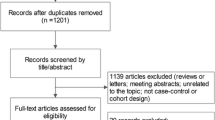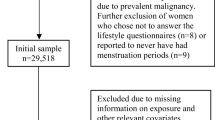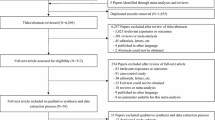Abstract
Hormone replacement therapy (HRT) has been considered one of the main risk factors for breast cancer. Studies demonstrating the relationship between HRT and breast cancer incidence were conducted in Western countries and the target populations were mainly Caucasians. Since the Women’s Health Initiatives demonstrated that HRT increased the risk of breast cancer with statistical significance, the number of HRT users in the United States has dramatically decreased. A recent case-control study has investigated the relationship between HRT and breast cancer in Japan, and here we review the results of this study to compare any discrepancy in breast cancer risk between Japanese and Western populations. For this case-control study, at seven institutions, women between the ages of 45 through 69 years, with histologically confirmed breast cancer, were selected as the case group. An age-adjusted control group was selected, using hospital-based data, including records of those screened for lung, gastrointestinal, and gynecological cancer. Questionnaires were administered, and items questioned included various factors related to the incidence of breast cancer: age at diagnosis, body mass index (BMI), smoking habit, age at menopause, birth history, number of births, number of children, history of breast feeding, familial background, and menopausal status. In total, 6183 samples (98.4% of the estimated samples) were put into the database. Data from 276 samples were excluded due to ineligibility. Finally, 5861 samples (3434 cases and 2427 controls) were analyzed. In 3316 cases, 164 (5.0%) patients received hormone-replacement therapy (HRT); on the other hand, 253 (10.7%) of 2355 controls received HRT. The odds ratio was 0.432 (95% confidence intervals [CI], 0.352–0.53), and there was a significantly negative correlation between HRT use and breast cancer. The risk factors in Japanese women showed similar profiles to those in women in Western countries. However, we did find some different profiles of breast cancer risk in the Japanese women. Changing of lifestyle may increase breast cancer risk in Japan.
Similar content being viewed by others
References
The Editorial Board of Cancer Statistics in Japan (2003) Cancer statistics in Japan-2003. Foundation for Promotion of Cancer Research, Tokyo
Saeki T (2007) A report of results of a case-control study for relationship between hormone replacement therapy and breast cancer risk in Japan (in Japanese).
Henderson BE, Bernstein L (1991) The international variation in breast cancer rates: an epidemiological assessment. Breast Cancer Res Treat 18(Suppl 1):S11–S17
Ravdin PM, Cronin KA, Howlader N, et al. (2007) The decrease in breast-cancer incidence in 2003 in the United States. N Engl J Med 356:1670–1674
Willett WC, Rockhill B, Hankinson SE, et al. (2000) Epidemiology and nongenetic causes of breast cancer. In: Harris JR, Lippman ME, Morrow M, Osborne CK (eds) Diseases of the breast. Lippincott, Williams and Wilkins, Philadelphia, p 175
Hoegh H, McKendry CJ, Wright WE, et al. (unpublished report, 1992) Cancer incidence by race/ethnicity California, 1988–1989. Available from the California Department of Health Services, Sacramento, CA
Armstrong B, Doll R (1975) Environmental factors and cancer incidence and mortality in different countries, with special reference to dietary practices. Int J Cancer 15:617–631
Kelsey JL, Fischer DB, Holford TR, et al. (1981) Exogenous estrogens and other factors in the epidemiology of breast cancer. J Natl Cancer Inst 67:327–333
Key TJ, Appleby PN, Reeves GK, et al. (2003) Body mass index, serum sex hormones, and breast cancer risk in postmenopausal women. J Natl Cancer Inst 95:1218–1226
Writing Group for the Women’s Health Initiative Investigators (2002) Risks and benefits of estrogen plus progestin in healthy postmenopausal women. JAMA 288:321–333
Cho E, Spiegelman D, Hunter DJ, et al. (2003) Premenopausal fat intake and risk of breast cancer. J Natl Cancer Inst 95:1079–1085
Harashima E, Nakagawa Y, Urata G, et al. (2007) Time-lag estimate between dietary intake and breast cancer mortality in Japan. Asia Pac J Clin Nutr 16:193–198
Collaborative Group on Hormonal factors in Breast Cancer. (2001) Familial breast cancer: collaborative reanalysis of individual data from 52 epidemiological studies including 58 209 women with breast cancer and 101 986 women without the disease. Lancet 358: 1389–1399
Eisinger F, Bruke W (2002) Breast cancer and breastfeeding. Lancet 361:176–177
Smith-Warner SA, Spiegelman D, Yaun SS, et al. (1998) Alcohol and breast cancer in women: a pooled analysis of cohort studies. JAMA 279:535–540
Thune I, Brenn T, Lund E, et al. (1997) Physical activity and the risk of breast cancer. N Engl J Med 336:1269–1275
Marshall LM, Hunter DJ, Connolly JL, et al. (1997) Risk of breast cancer associated with atypical hyperplasia of lobular and ductal types. Cancer Epidemiol Biomarkers Prev 6:297–301
Dupont WD, Page DL (1985) Risk factors for breast cancer in women with proliferative breast disease. N Engl J Med 312:146–151
Million Women Study Collaborators (2003) Breast cancer and hormone-replacement therapy in the Million Women Study. Lancet 362:419–427
The National Health and Nutrition Survey in Japan, 2004 (2004) Ministry of Health, Labor and Welfare Japan, Tokyo
Nagata C, Mizoue T, Tanaka K, et al.; Research Group For Development And Evaluation of Cancer Prevention Strategies in Japan (2006) Jpn J Clin Oncol 36:387–394
Author information
Authors and Affiliations
Corresponding author
About this article
Cite this article
Saeki, T., Sano, M., Komoike, Y. et al. No increase of breast cancer incidence in Japanese women who received hormone replacement therapy: overview of a case-control study of breast cancer risk in Japan. Int J Clin Oncol 13, 8–11 (2008). https://doi.org/10.1007/s10147-007-0728-0
Received:
Published:
Issue Date:
DOI: https://doi.org/10.1007/s10147-007-0728-0




